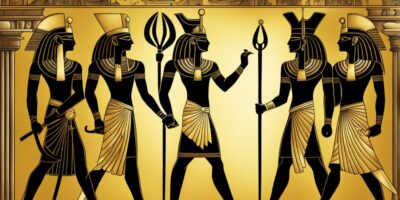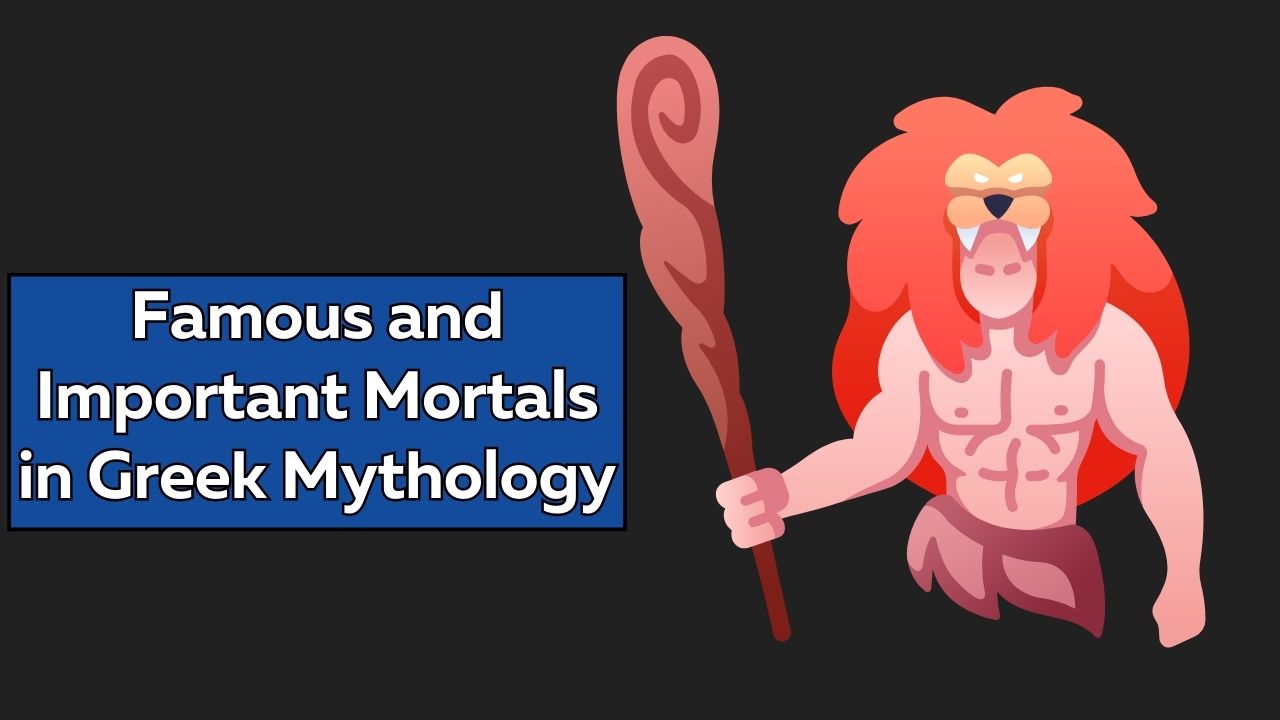Delve into the labyrinth of Greek mythology, and you’ll come across a haunting tale that has perplexed scholars and readers for centuries – the murder of Agamemnon by Aegisthus and Clytemnestra. This chilling story has left countless people wondering why these characters, entangled in a web of deceit, would commit such a heinous act. As we journey through this legendary narrative, we’ll unearth the complex motivations and underlying reasons that led to this tragic event.
Reason 1: Ancient Prophecies
The Curse of Thyestes: The gruesome tale begins with a dark prophecy. Agamemnon’s father, Atreus, and Aegisthus’s father, Thyestes, were embroiled in a bitter family feud. Atreus served his brother a meal that included the flesh of Thyestes’s own children. In his anguish, Thyestes cursed the house of Atreus, foretelling the doom that would befall Agamemnon and Aegisthus.
Fulfilling the Curse: Aegisthus and Clytemnestra believed that the curse had to be fulfilled to bring an end to the cycle of vengeance. They saw Agamemnon’s death as a way to break free from the ancient curse that had haunted their families for generations.
Inescapable Fate: In Greek mythology, prophecies were often seen as inescapable. Aegisthus and Clytemnestra may have felt that they had no choice but to carry out the prophecy, leading to Agamemnon’s murder.
Reason 2: Clytemnestra’s Revenge
Betrayal and Grief: Agamemnon’s journey to Troy lasted ten long years. During his absence, Clytemnestra endured immense suffering, including the loss of their daughter Iphigenia, whom Agamemnon sacrificed for favorable winds to sail to Troy. Her anguish, anger, and sense of betrayal drove her to seek revenge.
Return of Cassandra: Agamemnon’s return from the Trojan War brought with it Cassandra, the prophetess and his war prize. Clytemnestra couldn’t bear the sight of her husband with another woman, and this jealousy and anger fueled her desire for vengeance.
A Heart-Wrenching Act: Clytemnestra’s plot to kill Agamemnon can be seen as a desperate and tragic act to avenge the wrongs done to her and her family. Her emotions overwhelmed her reason, leading to the murder.
Reason 3: Aegisthus’s Ambition
Usurping Power: Aegisthus had long harbored ambitions of ruling Mycenae, the kingdom of Agamemnon. With Agamemnon away at war, he saw an opportunity to seize power.
Revenge for His Father: Aegisthus also had a personal vendetta against Agamemnon. He blamed him for the gruesome fate of his father, Thyestes, and sought vengeance for this heinous act.
Seizing the Moment: Aegisthus’s lust for power, combined with his thirst for revenge, led him to conspire with Clytemnestra to kill Agamemnon upon his return. This ambition was a driving force behind the murder.
Reason 4: Infidelity and Disloyalty
Affair with Cassandra: Agamemnon’s affair with Cassandra, a Trojan princess and a captive of war, was a stark display of his disloyalty to Clytemnestra. This infidelity deeply hurt Clytemnestra and fueled her desire to eliminate her unfaithful husband.
Question of Legitimacy: Clytemnestra may have worried about the legitimacy of her children’s claim to the throne if Cassandra’s children were recognized as Agamemnon’s heirs. This uncertainty could have motivated her to take drastic action.
Question of Honor: In the ancient Greek world, a man’s honor and reputation were paramount. Agamemnon’s actions tarnished his reputation, and Clytemnestra might have seen his death as a way to restore the family’s honor.
Reason 5: The Trojan War’s Toll
Sacrifices and Loss: The Trojan War brought immense sacrifices and suffering. Many Greek soldiers perished, including their own son, Orestes, who died in the conflict. The toll the war took on the family could have driven Aegisthus and Clytemnestra to madness.
Lingering Trauma: The trauma of the war could have left Aegisthus and Clytemnestra psychologically scarred. This trauma might have clouded their judgment and driven them to commit an act of revenge and catharsis.
Revenge for Fallen Loved Ones: The deaths of their family members and friends in the war might have pushed Aegisthus and Clytemnestra to blame Agamemnon for the bloodshed and seek vengeance.
Reason 6: Divine Intervention
The Will of the Gods: In Greek mythology, the gods often played a crucial role in the lives of mortals. Some believed that the gods themselves manipulated events to bring about Agamemnon’s downfall, possibly using Clytemnestra and Aegisthus as mere instruments of fate.
Divine Wrath: The gods may have been angered by Agamemnon’s actions and sought to punish him. Clytemnestra and Aegisthus could have been seen as the agents of divine retribution.
A Higher Purpose: Believers in the supernatural might view Agamemnon’s death as a necessary sacrifice for a higher purpose, one that only the gods comprehended.
Reason 7: Political Machinations
Consolidation of Power: In ancient Greece, power struggles were common. Aegisthus may have viewed Agamemnon as an obstacle to his political ambitions and sought to eliminate him to secure his own rule.
Mycenaean Politics: Mycenae was a kingdom known for its complex political landscape. Aegisthus might have believed that the murder of Agamemnon was a strategic move to maintain control.
Alliance with Clytemnestra: Aegisthus and Clytemnestra’s alliance in the murder could have been motivated by a desire to establish a stable and cooperative rule over Mycenae.
Reason 8: Manipulation and Seduction
Clytemnestra’s Influence: Clytemnestra’s persuasive skills and seductive charm could have played a significant role in convincing Aegisthus to join her in the conspiracy. Her influence might have swayed his decisions.
Shared Goals: Both Aegisthus and Clytemnestra shared common goals of revenge, power, and the desire to rid themselves of Agamemnon. Their partnership was built on mutual understanding and shared objectives.
A Fatal Attraction: Clytemnestra and Aegisthus’s connection, both emotionally and politically, could have led to the tragic conclusion of Agamemnon’s life.
Reason 9: The Curse of the House of Atreus Continues
Endless Cycle of Vengeance: The curse that began with the sins of Atreus and Thyestes had cast a long shadow over the house of Atreus. Aegisthus
and Clytemnestra believed that to break this curse, they had to carry out the gruesome act of killing Agamemnon, fulfilling the prophecy and ending the cycle of vengeance that had plagued their families for generations.
A Desperate Attempt: It might have seemed to Aegisthus and Clytemnestra that the only way to bring closure to the cursed history of their family was to commit the act of murder. The weight of their ancestors’ sins could have weighed heavily on their minds.
Ancient Beliefs: In ancient Greece, belief in curses, prophecies, and divine retribution was prevalent. Aegisthus and Clytemnestra may have felt that they were compelled by a force greater than themselves to carry out this dreadful act.
Reason 10: The Role of Guilt
Concealing Their Guilt: After Agamemnon’s return, Aegisthus and Clytemnestra may have feared that their involvement in the murder of Agamemnon would be discovered. To protect themselves from the consequences of their actions, they may have felt compelled to eliminate Agamemnon.
Paranoia and Fear: The fear of Agamemnon’s vengeance for their past transgressions could have driven Aegisthus and Clytemnestra to take drastic measures. Their paranoia and guilt may have clouded their judgment.
Securing Their Future: By killing Agamemnon, they may have believed that they could secure their place and protect their interests, free from the threat of retaliation from the powerful king.
Reason 11: Misguided Ambitions
Illusions of Grandeur: Aegisthus and Clytemnestra might have been deluded by their own ambitions, believing that by taking control of Mycenae, they could establish a legacy greater than Agamemnon’s.
The Quest for Immortality: In ancient Greece, individuals often sought to achieve a form of immortality through their actions. By eliminating Agamemnon, Aegisthus and Clytemnestra might have believed that they could etch their names into the annals of history.
Grandiosity and Overconfidence: A sense of overconfidence in their own abilities and ambitions may have driven them to commit the murder, believing that they could succeed where others had failed.
Reason 12: The Influence of the Furies
The Avenging Spirits: In Greek mythology, the Furies were malevolent spirits who sought retribution for bloodshed within families. Aegisthus and Clytemnestra’s act may have been driven by a belief in the influence of the Furies, who would hound them until they carried out the murder.
Relentless Pursuit: The Furies were relentless in their pursuit of those who had committed heinous acts. Aegisthus and Clytemnestra might have felt compelled to commit the murder to escape the wrath of these vengeful spirits.
Forced by Divine Forces: The fear of divine retribution and the torment of the Furies could have pushed Aegisthus and Clytemnestra to the point of no return, compelling them to act.
Reason 13: Manipulation by External Forces
Influence of Other Characters: Aegisthus and Clytemnestra might have been manipulated or influenced by other characters in the story, such as the chorus or the watchman, who played significant roles in the unfolding drama.
The Power of Persuasion: A persuasive character, such as the chorus or a trusted advisor, could have swayed Aegisthus and Clytemnestra to commit the murder, convincing them that it was the only course of action.
Pressure from Allies: They may have been under the influence of allies who had their own motives for eliminating Agamemnon. These external forces might have pushed Aegisthus and Clytemnestra to commit the act.
Reason 14: The Darkness of Human Nature
The Capacity for Evil: Aegisthus and Clytemnestra’s actions could be seen as a reflection of the dark and destructive side of human nature. The story serves as a reminder of the depths to which individuals can descend when consumed by vengeance and ambition.
Human Frailty: The tragic tale of Agamemnon’s murder is a testament to the frailty of human character. Aegisthus and Clytemnestra’s descent into darkness showcases the potential for evil that resides within us all.
A Warning for All: The story serves as a cautionary tale, urging individuals to be mindful of the consequences of their actions and the darkness that can lurk within their hearts.
Reason 15: Complex Motivations
A Multifaceted Conspiracy: The murder of Agamemnon is not driven by a single motive but by a complex web of emotions, ambitions, and beliefs. Aegisthus and Clytemnestra’s decision to kill Agamemnon is the culmination of a myriad of factors, making it a multi-layered and perplexing act.
Human Complexity: The characters’ motivations reflect the intricate and multifaceted nature of human psychology. Aegisthus and Clytemnestra’s actions remind us that humans are driven by a wide range of emotions and desires, making their decisions far from straightforward.
The Power of Tragedy: The tragic story of Agamemnon’s murder continues to captivate audiences because it delves into the intricate workings of the human psyche, revealing the complexities of human behavior.
Conclusion
The murder of Agamemnon by Aegisthus and Clytemnestra is a chilling tale that reveals the depth of human emotions, ambitions, and the influence of fate and the divine. As we unravel the complex motivations behind this heinous act, we are reminded that Greek mythology, like life itself, is fraught with shades of gray, where actions are rarely black and white. The murder of Agamemnon stands as a timeless and perplexing example of the intricate workings of the human heart and the enduring power of ancient tales.







Leave a Reply